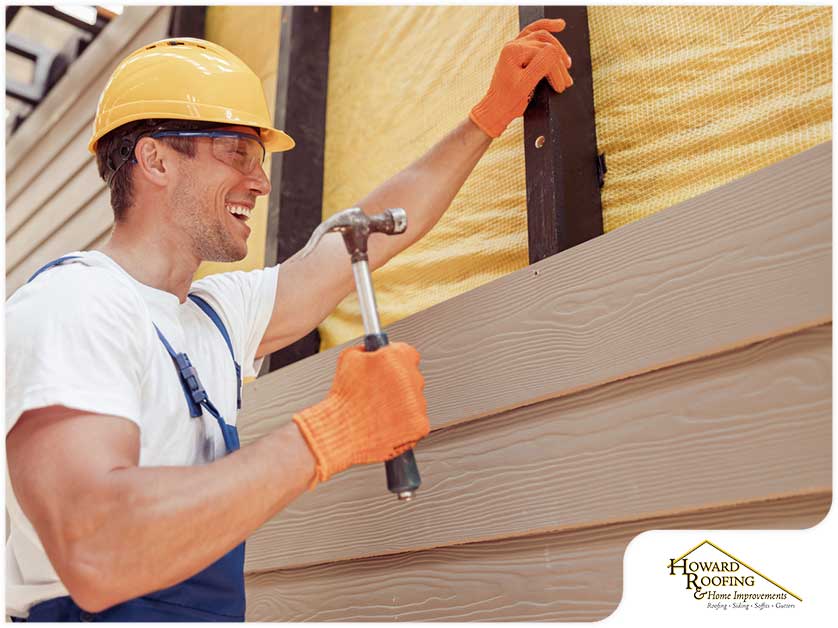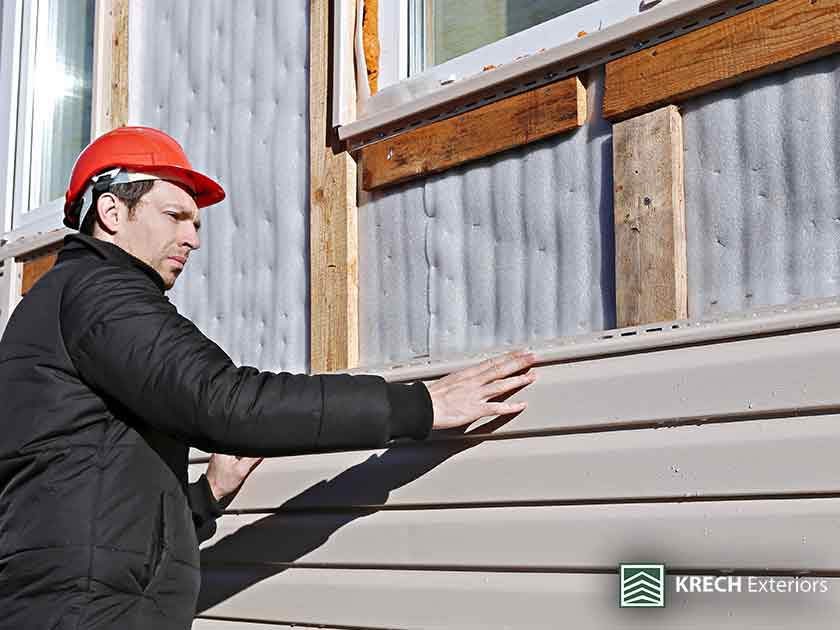The Vital Overview to the Numerous Kinds of Home Siding and Their Distinct Benefits
In the world of home improvement, selecting the right house siding is a critical choice that impacts both aesthetic charm and useful efficiency. With so numerous choices to consider, which home siding material really stands out for your specific task?
Timber Siding
Wood siding, a preferred selection for property exteriors, provides an ageless aesthetic that incorporates all-natural elegance with architectural honesty. This house siding material is offered in different styles, consisting of clapboard, roof shingles, and board-and-batten, allowing house owners to tailor their façade to match their design preferences. Wood exterior siding is commonly crafted from sturdy species such as cedar, redwood, or pine, which are understood for their strength and ability to withstand environmental stress factors.
Among the primary benefits of wood exterior siding is its exceptional insulation residential properties, which can add to power effectiveness and lower heating prices. In addition, wood house siding is eco-friendly, making it an eco friendly alternative when sourced sustainably. Normal maintenance, consisting of paint or discoloration, can extend its life-span and improve its look, enabling house owners to maintain the all-natural appeal of the wood.
Nevertheless, potential drawbacks consist of vulnerability to insects, rot, and weather damages, necessitating sufficient therapy and maintenance - morris siding contractor. In spite of these problems, when correctly taken care of, timber exterior siding can give a stunning and resilient remedy that enhances the character of a home while offering a warm, inviting environment

Vinyl Home Siding
Vinyl house siding has become a leading option for home owners looking for a low-maintenance outside choice that integrates resilience and affordability. This versatile material is crafted from polyvinyl chloride (PVC), making it immune to different climate condition, consisting of wetness and UV rays. Therefore, vinyl exterior siding does not warp, rot, or fade, ensuring long-lasting aesthetic allure.
Among the key advantages of vinyl siding is its extensive array of styles and shades, permitting house owners to achieve the wanted look for their residential property without the requirement for constant repainting. Additionally, plastic home siding is simple to mount, which can considerably decrease labor expenses throughout construction or restoration jobs.
Vinyl home siding likewise adds to power performance. Many alternatives attribute insulation support, which enhances thermal performance, assisting to preserve comfy interior temperatures and potentially reducing energy expenses. Its smooth surface helps with simple cleaning, requiring only periodic cleaning with a yard pipe to eliminate dirt and debris.
Fiber Cement Exterior Siding
Fiber cement home siding has acquired grip amongst building contractors and home owners alike as a result of its exceptional combination of sturdiness and aesthetic flexibility. Made up of a mix of cellulose, sand, and cement fibers, this home siding option is crafted to hold up against severe weather, consisting of high winds, heavy rain, and temperature level changes, making it a lasting choice for property exteriors.

Among the main advantages of fiber cement siding is its resistance to pests, such as termites, and its non-combustible nature, offering boosted fire safety. morris siding contractor. Furthermore, it is readily available in a large variety of next page appearances, styles, and colors, permitting homeowners to achieve their desired visual without giving up performance
One more advantage is its reduced upkeep requirements; fiber cement home siding generally needs paint or staining every 5-10 years, which is less regular than various other products. Its durability a fantastic read contributes to a reduced general price of possession, as it lowers the demand for frequent repairs or substitutes.
Inevitably, fiber concrete exterior siding stands for a superb financial investment for those seeking a resilient, attractive, and versatile exterior option, combining both form and feature to enhance the home's curb appeal.
Metal Siding
The allure of steel house siding hinges on its durable toughness and contemporary aesthetic appeal, making it a favored choice for modern architecture. Offered in products such as light weight aluminum and steel, metal siding offers an array of colors and coatings, enabling property owners to achieve a personalized appearance that complements their style vision.

Power efficiency is another significant advantage, as many steel home siding items are made with insulation alternatives that aid manage interior temperature levels. This can cause lowered power expenses in time. Furthermore, metal siding is frequently recyclable, making it an eco-friendly selection for sustainability-minded home owners.
The installment procedure for metal exterior siding can be relatively uncomplicated, causing a quicker turn-around time for building and construction tasks. On the whole, metal exterior siding combines functionality and design, making it a functional alternative for those looking for a aesthetically appealing and long-lasting outside finish.
Brick and Rock House Siding
Brick and rock home siding stands apart as a timeless selection that go to website improves the aesthetic charm of any kind of home. Understood for their resilience and reduced maintenance, these products give a remarkable return on investment while elevating the residential or commercial property's aesthetic charm. Readily available in different shades, structures, and patterns, block and rock can be tailored to match diverse building styles, from standard to modern.
Among the main benefits of brick and stone exterior siding is their power performance. Both products possess all-natural protecting residential or commercial properties that assist manage indoor temperatures, potentially lowering cooling and heating prices. In addition, they offer exceptional fire resistance contrasted to various other exterior siding alternatives, contributing to boosted safety and security.
Another benefit is their long life. Brick and stone can last for decades, typically needing minimal upkeep beyond occasional cleaning. Unlike wood home siding, they are invulnerable to parasites and rot, making certain a long-lasting exterior that withstands the elements.
Conclusion
In summary, the selection of siding considerably impacts a home's aesthetic charm, energy performance, and upkeep requirements. Each type of home siding-- whether timber, vinyl, fiber cement, metal, or block and rock-- offers unique advantages customized to different property owner preferences and ecological problems. Recognizing these choices allows informed choices that boost both the longevity and aesthetic appeal of property exteriors. Ultimately, picking the ideal exterior siding is vital for achieving an equilibrium between functionality and layout in property architecture.
One of the primary advantages of wood home siding is its outstanding insulation residential properties, which can contribute to energy performance and lower heating prices. Additionally, wood exterior siding is eco-friendly, making it an ecologically pleasant option when sourced sustainably.One of the main advantages of steel siding is its resistance to different environmental variables.Energy effectiveness is another considerable benefit, as many metal home siding items are designed with insulation alternatives that help regulate interior temperatures. Each type of exterior siding-- whether wood, vinyl, fiber steel, concrete, or brick and rock-- uses unique benefits tailored to various homeowner preferences and environmental conditions.